中原诗歌文化英译
中国古诗词英译..
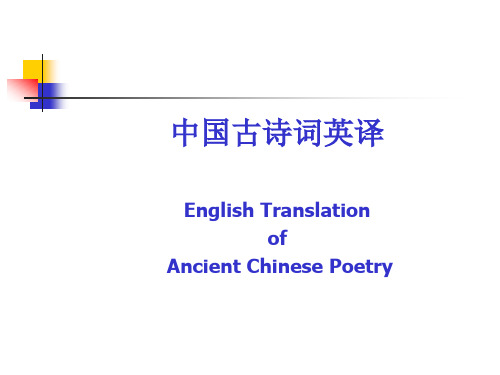
华裔学者叶维廉翻译了Chinese Poetry: Major Modes and Genres(汉诗 英华,1970),被英美许多大学作为教 材多次重印。
J.D.Frodsham等人编译了Anthology of Chinese Verse(中国诗选集,1967), John A. Turner翻译了A Golden Treasury of Chinese Poetry(英译汉诗金 库,1976),包含了自周至清代120多首 古诗译文。
同期,美国翻译家William McNaughton全面翻译了《诗经》(The Classic Anthology Defined by Confucius, 1971),瑞典汉学家B.Karlgren也英译 《诗经》(The Book of Odes, 1950)。 由Robert Kotewall和Norman L. Smith合 译的The Penguin Book of Chinese Verse (企鹅丛书· 中国诗歌卷),在中诗英译 经典化方面开了先河。
1867年,法国贡古尔学院女院士 Judith.Gautier翻译的中国古诗《玉书》 (Le Livre de Jade)被译成多种语言, 在西方世界引起很大反响。 20世纪德国伟大的作曲家Gustav Mahler把《玉书》德文译本的李白、王 维和孟浩然等作为歌词,写成了享誉世 界的合唱交响乐Das Lied von der Eerde (大地之歌)。
诗歌是讲意境的,意境包含两层含义: 一是诗歌的内容是有意蕴的,有着相当的文化内涵,诗歌的 意境和意味便来源于意蕴。艾略特所说的诗歌的可理解性、超民 族性指的就是这个。 诗歌的意蕴决定着诗歌的意义符号系统(sign system),诗歌 的可译性基本取决于此。诗歌的意蕴要素有情感、意象、情景、 人物、事件等是可译的。 当然,在一种语言符号系统中所包含的某些意蕴并不一定能 在别的语言符号系统中找到对等的意蕴,尤其是一个民族所独有 的文化意蕴。比如,中国文化中“君子”好逑、潇湘之“兰”这 两个意象的文化意蕴在西方的任何一个语种中很难找到对应物。 然而,这种意蕴一经阐释,总可以让其他民族的人能了解、理解, 进而达到共鸣。这种诗歌意蕴的可阐释性就是诗歌的可译性。
信阳民歌英译
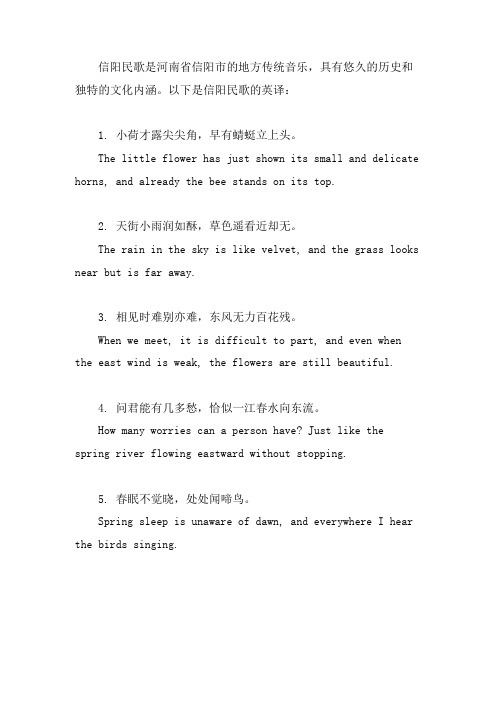
《广西土地资源图集》的技术设计探讨[摘要]按照《广西土地资源图集》编制的要求,对制图区域的制图要素进行分析,根据各要素的分布特征和规律,确定各要素制图综合的原则和取舍、概括的指标,对制图要素进行综合,形成反映各制图区域各专题要素分布特征和规律的图集成果。
[关键词]广西土地资源图集设计编排制图1广西土地资源概况及特点1.1自然地理广西地处中国华南,位于东经104°26’—112°04’,北纬20°54’—26°24’之间,东西最大跨距约771公里,南北最大跨距(南至斜阳岛)约634公里。
南临北部湾,与海南省隔海相望,东连广东,东北接湖南,西北靠贵州,西邻云南,西南与越南毗邻。
陆地区域面积23.76万平方公里,占全国国土总面积的2.5%,居各省区市第9位。
广西是中国与东盟之间唯一既有陆地接壤又有海上通道的省区,是华南通向西南的枢纽,是全国唯一的具有沿海、沿江、沿边优势的少数民族自治区。
1.2土地利用结构与分布特点广西第二次土地调查的土地利用构成包括耕地、园地、林地、草地、城镇村及工矿用地、交通运输用地、水域及水利设施用地、其他土地。
由于自然条件和社会经济状况的差异,形成了各地用地结构的差异。
如耕地、交通运输用地、城镇村及工矿用地、水域等以城市郊区、河流冲积平原、丘陵地域及沿海台地为集中;牧草地、未利用土地,以桂西、桂西北、桂北、桂中等石山地为最大。
林地以桂东南到桂北这一山地丘陵区域面积最大;园地是以桂北、桂南丘陵缓坡为集中;石山地区园地面积最小。
2图集设计编排与基本内容2.1基本内容《图集》按扉页、序言、前言、编辑说明、目录、地图的顺序排列,其中地图又根据专题内容分为六个图组,并按序图组、土地利用图组、基本农田分布图组、耕地坡度分级图组、耕地坡度分级图组、未利用地分布图组、低丘缓坡资源分布图组排列。
每幅图以展开页为一个基本单元,主图放在展开页作为主题,在主图周边布置本图标题、相关图表等。
汉英翻译中原文化

中原文化与中原崛起解读中原文化,我们不难看出,历史上的河南之所以能够长期成为中国政治经济文化中心,成为中华崛起的高地,与根深叶茂的繁荣文化是分不开的。
当历史的车轮进入21世纪后,我们要实现中原崛起,很重要的一个方面,就是要开发我们的文化,发展我们的文化,创新我们的文化,要把我们丰富的文化资源变为强大的文化力量,促进又好又快发展,推动中原崛起。
所以省八次党代会明确提出要实现经济大省向经济强省跨越、文化资源大省向文化强省跨越。
这两个跨越相辅相成、缺一不可。
特别是随着经济文化化、文化经济化、经济文化一体化时代的到来,我们只有把这两大跨越有机结合起来,才能加快中原崛起的进程。
这次我们举办“中原文化香港行和2007年豫港贸易洽谈会”,实际上就是要充分展示中原文化的魅力,发挥中原文化的潜力、增强中原文化的吸引力,形成推动中原崛起的新动力。
为此,我们将坚持先进文化的前进方向,大力发展先进文化与和谐文化,坚持用科学理论引领中原崛起,用人文精神凝聚中原崛起,以文化产业支撑中原崛起,以人才智力支持中原崛起,以创新文化推动中原崛起,全面提升中原文化的引领能力、服务能力和创新能力,为实现中原崛起提供强大的精神支持、智力支持和不竭动力。
现阶段,我们首先要把家底摸清,弄清到底有多少文化的“金矿”、“银矿”、“铜矿”、“铁矿”。
这项工作,目前已经全面启动,在全省范围内展开了文化资源的普查,一俟普查结束我们就制定开发利用的规划。
从当前掌握的情况看,我们至少有以下八大产业可以很好地发展,这就是传媒出版、文博会展、文化旅游、功夫娱乐、影视动漫、戏曲演艺、书法绘画、网络创意等八大产业。
我省的这八大产业都是省委、省政府下一步将重点支持发展的产业,无论从资源禀赋看,还是市场潜力看,都具有明显的比较优势和可期的经济效益。
比如书法绘画,我们商丘市有一个王公庄村,家家户户画老虎,一年卖画四百万。
我们的开封市多数成年人都是书法爱好者或者是各级书协会员。
中国古诗名英文翻译对照
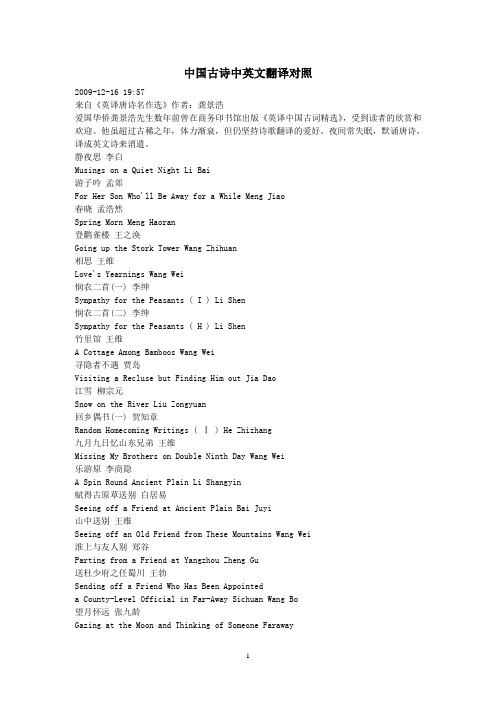
中国古诗中英文翻译对照2009-12-16 19:57来自《英译唐诗名作选》作者:龚景浩爱国华侨龚景浩先生数年前曾在商务印书馆出版《英译中国古词精选》,受到读者的欣赏和欢迎。
他虽超过古稀之年,体力渐衰,但仍坚持诗歌翻译的爱好。
夜间常失眠,默诵唐诗,译成英文诗来消遣。
静夜思李白Musings on a Quiet Night Li Bai游子吟孟郊For Her Son Who'll Be Away for a While Meng Jiao春晓孟浩然Spring Morn Meng Haoran登鹳雀楼王之涣Going up the Stork Tower Wang Zhihuan相思王维Love's Yearnings Wang Wei悯农二首(一) 李绅Sympathy for the Peasants ( I ) Li Shen悯农二首(二) 李绅Sympathy for the Peasants ( H ) Li Shen竹里馆王维A Cottage Among Bamboos Wang Wei寻隐者不遇贾岛Visiting a Recluse but Finding Him out Jia Dao江雪柳宗元Snow on the River Liu Zongyuan回乡偶书(一) 贺知章Random Homecoming Writings ( Ⅰ ) He Zhizhang九月九日忆山东兄弟王维Missing My Brothers on Double Ninth Day Wang Wei乐游原李商隐A Spin Round Ancient Plain Li Shangyin赋得古原草送别白居易Seeing off a Friend at Ancient Plain Bai Juyi山中送别王维Seeing off an Old Friend from These Mountains Wang Wei淮上与友人别郑谷Parting from a Friend at Yangzhou Zheng Gu送杜少府之任蜀川王勃Sending off a Friend Who Has Been Appointeda County-Level Official in Far-Away Sichuan Wang Bo望月怀远张九龄Gazing at the Moon and Thinking of Someone FarawayZhang J iuling白石滩王维White Stone Beach Wang Wei鸟鸣涧王维Birds Chirping over the Hill Creek Wang Wei春夜喜雨杜甫Propitious Rain Falling at Midnight Du Fu宿建德江孟浩然Staying Overnight on Jiande River Meng Haoran滁州西涧韦应物Chuzhou's West Brook Wei Yingwu题破山寺后禅院常建Meditation Rooms at the Back of the Cleft-BoulderHill Temple Chang Jian绝句杜甫A Heptasyllabic Quatrain Du Fu阙题刘脊虚A Poem Lacking a Title Liu Shenxu送元二使安西王维Sending off a Friend, Who Has Been Appointed Envoy to the West Lands Wang Wei凉州词王之涣Liangzhou Song Wang Zhihuan凉州词王翰Liangzhou Song Wang Hah夜宿山寺李白Staying Overnight in a Mountain Temple Li Bai杂诗(其二) 王维Miscellaneous Poems (Second in a Series) Wang Wei问刘十九自居易Asking a Friend Bai Juyi风李峤Wind Li Qiao马诗李贺A Horse Poem Li He秋浦歌李白Autumn Waterside Songs Li Bai剑客贾岛Jianke Jia Dao于易水送人骆宾王Sending off a Warrior By the Yishui River LuG Binwang 春怨金昌绪Complaint Against Spring lin Changxu竹枝词刘禹锡The Bamboo Song Liu Yuxi城东早春杨巨源Early Spring in East City Yang Juyuan晚春韩愈Late Spring Han Yu山亭夏日高骈A Summer's Day in a Hill Garden Gao Pian秋日耿讳An Autumn Day Geng Wei白雪歌送武判官归京岑参Snow (For Chief of Secretarial Staff Wu,Who Was B&ng Called Back to the Capital) Cen Shen过故人庄孟浩然Visiting an Old Friend's Country Place Meng Haoran江村即事司空曙Scene from a Riverside Village Sikong Shu社日王驾Community Day Wang Jia送人游吴杜荀鹤Seeing off a Friend, Who Was Going to Tour Suzhou Du Xunhe 枫桥夜泊张继Night Boat Call at Maple Bridge, Suzhou Zhang Ji早发白帝城李白Sailing Early from Baidi Town Li Bai黄鹤楼送孟浩然之广陵李白Seeing off Fellow Poet Meng Haoran, Who WasLeaving the Yellow Crane Tower for Yangzhou Li Bai黄鹤楼崔颢The Yellow Crane Tower Cui Hao夜雨寄北李商隐A Letter Sent North about These Nightly Rainsin Bashan Mountains Li Shangyin无题李商隐Poem Without a Title Li Shangyin登幽州台歌陈子昂Ascending Youzhou Terrace Chen Zi'ang与诸子登岘首孟浩然Climbing Mount Xianshou with Scholarly Friends Meng Haoran 滕王阁王勃Prince of Teng's Pavilion-House Wang Bo洛阳道储光羲The Luoyang Highway Chu Guangxi遣悲怀元稹Venting My Sorrow Yuan Zhen赠卖松人于武陵To a Tree Vendor Yu Wuling乌衣巷刘禹锡Black Robe Lane Liu Yuxi清明杜牧The Day of Clear and Bright Du Mu江南春杜牧Spring Comes to Jiangnan Du Mu泊秦淮杜牧Overnight Stay on Qinhuai River, Nanjing Du Mu山行杜牧Driving by the Mountain Du Mu金缕衣杜秋娘Garment Stitched with Gold Threads Du Qiuniang自遣罗隐Self Consolation Luo Yin题都城南庄崔护South Side of the Capital City Cui Hu月下独酌李白Drinking Alone Underneath a Moon Li Bai将进酒李白Drink Your Fill! Li Bai春日忆李白杜甫Remembering Li Bai on a Spring Day Du Fu春望杜甫Spring Outlook Du Fu前出塞杜甫Song of the Fortified Town (One from a First Group of"Fortified Town" Poems) Du Fu石壕吏杜甫A Village Official Du Fu陪诸贵公子丈八沟携妓纳凉晚际遇雨杜甫A Cruise on Long-Ditch Creek in the Company of Some Young Gentlemen and Their "Hired" Ladies, and Got Caught in a Shower Along the Twilight Hour Du Fu与朱山人杜甫To Zhu—the Mountain Person Du Fu赠卫八处士杜甫To a Younger Friend, Who Is a Retiring Sort of Person Du Fu李白篇送友人青山横北郭白水绕东城此地一为别孤蓬万里征浮云游子意落日故人情挥手自兹去萧萧班马鸣Farewell To A FriendGreen mountains bar the northern sky;White water girds the eastern town.Here is the place to say good-bye;You'll drift like lonely thisledown.With floating cloud you'll float away;Like parting day I'll part from you.We wave as you start on your way;Our steeds still neigh, "Adieu, adieu!"登金陵凤凰台凤凰台上凤凰游凤去台空江自流吴宫花草埋幽径晋代衣冠成古丘三山半落青天外二水中分白鹭洲总为浮云能蔽日长安不见使人愁On Phoenix Terrace At JinlingOn Phoenix Terrace once phoenixes came to sing;The birds are gone, but still roll on the river's waves. The ruined palace's buried 'neath the weeds in spring; The ancient sages in caps and gowns all lie in graves. The three-peak'd mountain is half lost in azure sky; The two-fork'd stream by Egret Isle is kept apart.As floating clouds can veil the bright sun from the eye, Imperial Court, now out of sight, saddens my heart.宣州谢眺楼饯别校书叔云弃我去者昨日之日不可留乱我心者今日之日多烦忧长风万里送秋雁对此可以酣高楼蓬莱文章建安骨中间小谢又清发俱怀逸兴壮思飞欲上青天览明月抽刀断水水更流举杯销愁愁更愁人生在世不称意明朝散发弄扁舟Farewell To Uncle Yun, The Imperial Librarian, At The Xie Tiao Pavilion In XuanzhouWhat left me yesterdayCan be retained no more;What worries me todayAre the times for which I feel sore.In autumn wind for miles and miles the wild geese fly.Let's follow them with eyes and drink in tower high.Your writing's forcible, like ancient poets, whileMine is in Junior Xie's direct and easy style.Both of us have ambitions high;We'd bring the moon down from the sky.Cut running water with a sword, it will faster flow;Drink wine to drown your sorrow, it will heavier grow.If we despair in our lifetime of all affairs,Tomorrow let us sail away with loosened hairs.赠汪伦李白乘舟将欲行忽闻岸上踏歌声桃花潭水深千尺不及汪伦送我情To Wang LunI, Li Bai, sit aboard a ship about to goWhen suddenly on shore your farewell songs o'erflow. However deep the Lake of Peach Blossom may be,It's not so deep, O Wang Lun! as your love for me.早发白帝城朝辞白帝彩云间千里江陵一日还两岸猿声啼不住轻舟已过万重山Leaving White Emperor Town At DawnLeaving at dawn the White Emperor crowned with cloud, I've sailed a thousand li through canyons in a day. With monkeys' sad adieus the riverbanks are loud;My skiff has left ten thousand mountains far away.月下独酌花间一壶酒独酌无相亲举杯邀明月对影成三人月既不解饮影徒随我身暂伴月将影行乐须及春我歌月徘徊我舞影零乱醒时同交欢醉后各分散永结无情游相期邈云汉Drinking Alone Under The MoonAmong the flowers from a pot of wineI drink alone beneath the bright moonshine.I raise my cup to invite the moon, who blendsHer light with my shadow and we're three friends. The moon does not know how to drink her share;In vain my shadow follows me here and there. Together with them for the time I stayAnd make merry before spring's spend away.I sing the moon to linger with my song;My shadow disperses as I dance along.Sober, we three remain cheerful and gay; Drunken, we part and each goes his way.Our friendship will outshine all earthly love; Next time we'll meet beyond the stars above.杜甫篇望岳岱宗夫如何齐鲁青未了造化钟神秀阴阳割昏晓荡胸生层云决眦入归鸟会当凌绝顶一览众山小Gazing At Mount TaiO, peak of peaks, how high it stands!One boundless green o'erspreads two states.A marvel done by nature's hands,O'er light ang shade it dominates.Clouds rise therefrom and lave my breast;I strain my eyes and see birds fleet.I must ascend the mountain's crest;It dwarfs all peaks under my feet.赠李白秋来相顾尚飘蓬未就丹砂愧葛洪痛饮狂歌空度日飞扬跋扈为谁雄To Li BaiWhen autumn comes, you're drifting still like thistledown. You try to find the way to heaven, but you fail.In singing mad and drinking dead your days you drown.For whom will fly the roc? For whom will leap the whale?兵车行车辚辚马萧萧行人弓箭各在腰耶娘妻子走相送尘埃不见咸阳桥牵衣顿足拦道哭哭声直上干云霄道旁过者问行人行人但云点行频或从十五北防河便至四十西营田去时里正与裹头归来头白还戍边边廷流血成海水武皇开边意未已君不闻汉家山东二百州千村万落生荆杞纵有健妇把锄犁禾生陇亩无东西况复秦兵耐苦战被驱不异犬与鸡长者虽有问役夫敢伸恨且如今年冬未休关西卒县官急索租租税从何出信知生男恶反是生女好生女犹得嫁比邻生男埋没随百草君不见青海头古来白骨无人收新鬼烦冤旧鬼哭天阴雨湿声啾啾Song Of The ConscriptsChariots rumbleand horses grumble.The conscripts march with bow and arrows at the waist.Their fathers, mothers, wives and children come in hasteTo see them off; the bridge is shrouded in dust they've raised.They clutch at the men's coats and stamp and bar the way;Their grief cries loud and strikes the cloud straight, straightaway. Another onlooker by roadside asks an enrollee,"The conscription is frequent," only answers he."Some went north at fifteen to guard the rivershoreAnd were sent west to till the land at forty-four.The elder bound their young heads when they went away;Just home, they're sent to the frontier though their hair's grey. The field on borderland becomes a sea of blood;The emperor's greed for land is still at high blood.Have you not heard two hundred districts east of the Hua Mountain lie Where briers and brambles grow in villages far and night?Although stout women can wield the plough and the hoe,They know not east from west where thorns and weeds o'ergrow.The enemy are used to hard and stubborn fight:Our men are driven just like dogs or fowls in flight.You are kind to ask me.To complain I'm not free.In winter of this yearConscription goes on here.The magistrates for taxes press;How can we pay them in distress!If we had known sons bring no joy,We'd have preferred girl to boy.A daughter can be married to a neighbour, alas!A son can only be buried under the grass!Have you not seenOn borders greenBleached bones since olden days unburied on the plain?The old ghosts weep and cry, while the new ghosts complain;The air is loud with screech and scream in gloomy rain."将进酒 ----李白君不见,黄河之水天上来,奔流到海不复回?君不见,高堂明镜悲白发,朝如青丝暮成雪?人生得意须尽欢,莫使金樽空对月,天生我材必有用,千金散尽还复来。
中国诗歌带英语翻译3篇

【导语】中国古典诗歌是中国传统⽂化的重要组成部分,包含着中国⽂化精髓。
中国古典诗歌英译因此⼀直是⽂学⼤家实践的重要⼯作。
下⾯是由⽆忧考带来的中国诗歌带英语翻译,欢迎阅读!【篇⼀】中国诗歌带英语翻译 七⾔律诗 王维 和贾舍⼈早朝⼤明宫之作 绛帻鸡⼈送晓筹,尚⾐⽅进翠云裘。
九天阊阖开宫殿,万国⾐冠拜冕旒。
⽇⾊才临仙掌动,⾹烟欲傍衮龙浮。
朝罢须裁五⾊诏,佩声归向凤池头。
Seven-character-regular-verse Wang Wei AN EARLY AUDIENCE AT THE PALACE OF LIGHT HARMONIZING SECRETARY JIA ZHI POEM The red-capped Cock-Man has just announced morning; The Keeper of the Robes brings Jade-Cloud Furs; Heaven\'s nine doors reveal the palace and its courtyards; And the coats of many countries bow to the Pearl Crown. Sunshine has entered the giants\' carven palms; Incense wreathes the Dragon Robe: The audience adjourns-and the five-coloured edict Sets girdle-beads clinking toward the Lake of the Phoenix.【篇⼆】中国诗歌带英语翻译 王维 奉和圣制从蓬莱向兴庆阁道中留春⾬中春望之作应制 渭⽔⾃萦秦塞曲,黄⼭旧绕汉宫斜。
銮舆迥出千门柳,阁道回看上苑花。
云⾥帝城双凤阙,⾬中春树万⼈家。
为乘阳⽓⾏时令,不是宸游玩物华。
Chinese_Poetry_中国诗歌介绍_英文版

Classical Chinese poetry Middle Tang :
• The Landscape Style Poem (山水诗):
Liu Changqing , Wei Yingwu • Bai Juyi , Han Yu , Meng Jiao , Liu Yusi , Liu Zongyuan , Li He
• Classical Chinese poetry
中国古典诗歌
• Modern Chinese poetry
中国现代诗歌
Classical Chinese poetry Beginnings of the tradition:
• Since the burning of books by Qin Shihuang, the earliest extant anthologies are the Shi Jing and Chu Ci, dating to the Spring and Autumn Period and the Warring States Period, respectively. • Shi Jing(诗经 "Classic of Poetry") was the first major surviving collection of Chinese poems, collecting both aristocratic poems (Odes) and more rustic poetry, probably derived from folksongs (Songs). They are mostly composed of four-character (四言) lines. • A second, more lyrical and romantic anthology was Chu Ci (楚 辞 "Songs of Chu"), made up primarily of poems ascribed to Qu Yuan and his follower Song Yu. These poems are composed of lines of irregular lengths, in the style prevalent in the state of Chu.
汉诗英译中原译文相异的合理性解释

P t t b r e r a e 的译文为: eS m
T es a o ' w n u e s h e s n s i d b f t myf c ; ae
译中自然存在汉诗英译中原译文相异这一现象。汉诗英译中原译 文相异指的是译文因漏译 、 译和异译 , 误 较原文或多或少有所增益 或减损 . 使得原译文不同一的现象, 这—现象随处可见。例如 : 诗句“ 月上柳梢头, 人约黄 昏后” 的译文为:
“ 风吹 面” 在许 渊冲 笔下译成了 c es r  ̄抚摸我 的脸) P tr a s( , ee
性可以从康德的认识论、 英汉语言所指和能指等语言差异 、 英汉文
化的不通约性 以及翻译忠实的非绝时 陛_ 筝几个方面加 以解释。 关键词 : 康德认识论 ; ; 能指 所指; 不可通约性; 忠实相砷 } 生 中图分类号 : 5 H1 9 文献标识码 : A 文章编号 :6 32 1 (0 20 - 0 50 17 - 112 1 )70 6- 3 - -
一
诗歌 的当下性 、历史性的存在方式使得其必须借助译者的知 性加工才能实现 , 这过程主体经验的介入必然会留下主体的痕迹。
如:
淅淅风欢面 . 纷纷雪积身。
许渊冲的译文为 :
Gu t yg s w n sc r s myfc s b u t i d a e s ae F a e o a e s o c v r l ta e lk n f k n w o e s l rc . l a
卷天风雪夜敲门 。 寂寞纺车伴老 ^ 。 昌 寸古 卡- 晨汲水 . 青泪恐难禁。 盘 讳
就会在译文中留下主体的痕迹 , 这必然会带来原文与译文之间的
相异 。
其意境正是普希金笔下的《 冬天的黄 昏》寥寥 几语转达了普 , 希金的干字长诗。
中国古代诗歌的英文翻译
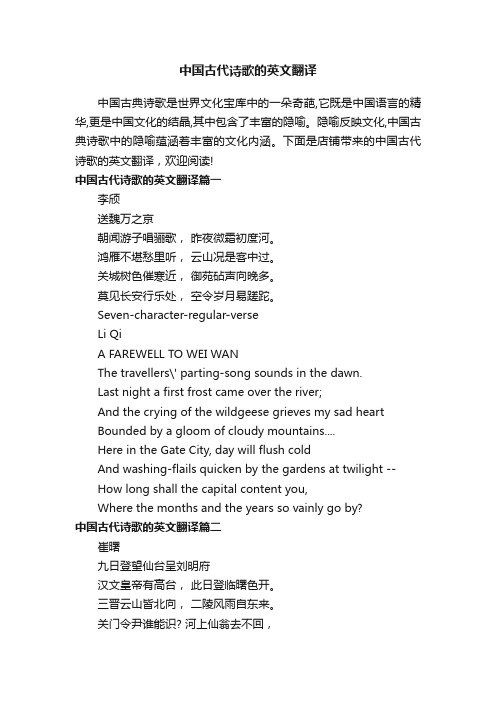
中国古代诗歌的英文翻译中国古典诗歌是世界文化宝库中的一朵奇葩,它既是中国语言的精华,更是中国文化的结晶,其中包含了丰富的隐喻。
隐喻反映文化,中国古典诗歌中的隐喻蕴涵着丰富的文化内涵。
下面是店铺带来的中国古代诗歌的英文翻译,欢迎阅读!中国古代诗歌的英文翻译篇一李颀送魏万之京朝闻游子唱骊歌,昨夜微霜初度河。
鸿雁不堪愁里听,云山况是客中过。
关城树色催寒近,御苑砧声向晚多。
莫见长安行乐处,空令岁月易蹉跎。
Seven-character-regular-verseLi QiA FAREWELL TO WEI WANThe travellers\' parting-song sounds in the dawn.Last night a first frost came over the river;And the crying of the wildgeese grieves my sad heartBounded by a gloom of cloudy mountains....Here in the Gate City, day will flush coldAnd washing-flails quicken by the gardens at twilight --How long shall the capital content you,Where the months and the years so vainly go by?中国古代诗歌的英文翻译篇二崔曙九日登望仙台呈刘明府汉文皇帝有高台,此日登临曙色开。
三晋云山皆北向,二陵风雨自东来。
关门令尹谁能识? 河上仙翁去不回,且欲竟寻彭泽宰,陶然共醉菊花杯。
Seven-character-regular-verseCui ShuA CLIMB ON THE MOUNTAIN HOLIDAYTO THE TERRACE WHENCE ONE SEES THE MAGICIANA POEM SENT TO VICE-PREFECT LUThe Han Emperor Wen bequeathed us this terraceWhich I climb to watch the coming dawn.Cloudy peaks run northward in the three Jin districts,And rains are blowing westward through the two Ling valleys....Who knows but me about the Guard at the Gate,Or where the Magician of the River Bank is,Or how to find that magistrate, that poet,Who was as fond as I am of chrysanthemums and winecups? 中国古代诗歌的英文翻译篇三李白登金陵凤凰台凤凰台上凤凰游,凤去台空江自流。
中国古诗词英译
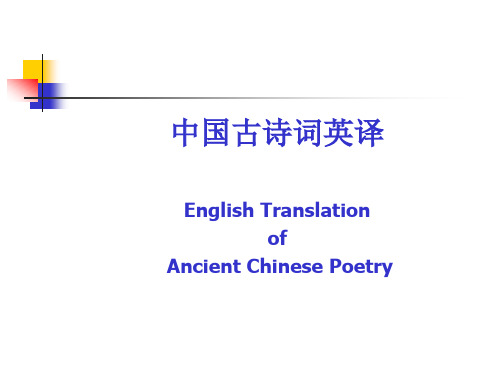
从中国古诗选集英译来看,突出的 有当代著名汉学家Burton Watson编译的 Chinese Rhymed-Prose(中国韵文, 1971)和The Columbia Book of Chinese Poetry: from Early Times to the ห้องสมุดไป่ตู้hirteenth Century(哥伦比亚中国诗选: 从早期到13世纪,1984)。后者涵盖了 中国诗歌史典型诗人诗作,对西方文坛 产生了重大的影响。
中国古诗词英译
English Translation of Ancient Chinese Poetry
一. 历史的演绎
中诗英译最早见于16世纪后期出版的 《英文诗艺》(The Arte of English Poesie,1589),译者是英国学者Richard Puttenham,探讨了双语诗词格律。
Martin Luther(1483-1546)是16世 纪《圣经》的翻译家,其观点是,译文 应当使读者领悟,审美风格方面应当本 土化。 George Chapman (1559-1634)认为, 翻译要抓住原作的“神”(spirit)和 “韵”(tone),使译文的神韵如同原 作的再生(transmigration)。
“本土化”是容易理解的,“再生”是多 层面的,有“转世,轮回,移民,移居” 等含义。关于关于这个“再生”,它具 有外移和内移两个相反的流向。对于汉 诗英译来讲,便是文化外移。外移后的 汉诗是不是从形式到意蕴完全保留了中 国原装的汉诗呢?不是的。
一首诗的英译本到了美国,译文所承载 的文化不是纯正的美国文化,必然带有 中国文化的痕迹。这首译诗不再和原中 文诗歌有着某种信息的完全对称,因为 在翻译诠释的过程中,符号在一定程度 上发生了变化,符指自然也有所不同。 翻译诠释后,原文本和目标文本所具有 的美学特征也不再是完全对等的,这是 由于诠释必然导致诠释熵变造成的。
文学文化相关的汉译英作品

文学文化相关的汉译英作品在文学文化领域中,有许多汉译英作品,涵盖了不同时期和不同体裁的作品。
下面我将从不同角度介绍一些代表性的汉译英作品。
1. 古典文学:《红楼梦》(Dream of the Red Chamber),这是中国古代四大名著之一,由高鹗翻译成英文。
它描绘了贾宝玉和林黛玉之间的爱情悲剧,展示了封建社会的荣辱兴衰。
《诗经》(The Book of Songs),由Arthur Waley翻译成英文,是中国最早的诗歌总集,反映了古代社会的风俗民情和人们的情感体验。
2. 现代文学:《茶馆》(Teahouse),由郭沫若翻译成英文,是中国现代剧作家老舍的代表作之一,通过一个茶馆的故事,展现了中国社会的变迁和人民的命运。
《家》(Family),由Pearl S. Buck翻译成英文,是中国作家巴金的自传体小说,描述了一个普通农民家庭的生活和命运,揭示了封建社会的残酷和个人的奋斗。
3. 当代文学:《活着》(To Live),由Michael Berry翻译成英文,是中国作家余华的作品,讲述了一个普通农民的一生,反映了中国社会的动荡和人民的坚韧生活态度。
《白夜行》(Journey Under the Midnight Sun),由Mark Ealey翻译成英文,是日本作家东野圭吾的作品,描绘了两个人命运交织的故事,探讨了人性的复杂和社会的黑暗面。
4. 诗歌:李白的诗歌,许多李白的诗歌被翻译成英文,如《静夜思》(Quiet Night Thoughts)、《将进酒》(Bring in the Wine)等,展现了李白豪放的诗意和对自然的热爱。
骆宾王的诗歌,骆宾王的一些诗歌也被翻译成英文,如《登鹳雀楼》(Ascending the Stork Tower),表达了他对壮丽景色和人生哲理的思考。
这些作品通过汉译英的方式,将中国文学文化的精髓传递给了全世界的读者。
它们不仅展示了中国古代和现代社会的特点,还传达了人类共同的情感和价值观。
中英互译诗歌

中英互译诗歌1. 中英互译诗歌就像一座桥梁,连接着两种截然不同却又同样迷人的文化世界。
你想想看,就像李白的,“床前明月光,疑是地上霜。
”英文翻译过来是“Before my bed, there is bright moonlight, so that it seems like frost on the ground.”这一译,就好像给这首古老的中国诗穿上了一件西方的文化外衣,别有一番风味呢。
2. 中英互译诗歌是一场奇妙的文化之旅。
有时候,英文诗歌翻译成中文,就像把一颗来自远方的种子种在中国的文化土壤里。
比如说雪莱的中的一句“O wild West Wind, thou breath of Autumn's being.”翻译成“哦,狂野的西风,你是秋之生命的气息。
”那种激昂的情感在中文里也能让我们感同身受,仿佛我们也置身于那西风呼啸的场景之中。
3. 中英互译诗歌简直是魔法呀。
你知道吗?当把中文诗歌译成英文,就像把东方的精灵送到西方的仙境。
像王维的“大漠孤烟直,长河落日圆。
”变成“ In the vast desert, lone smoke rises straight; over the long river, the setting sun is round.” 原本那幅苍凉而壮阔的画面在英文里也能栩栩如生地展现出来,这不是魔法是什么呢?4. 中英互译诗歌就像是一场跨文化的对话。
我有个朋友特别喜欢读英文诗,可他英语不太好,于是就看中文翻译版。
有一次读到济慈的“ A thing of beauty is a joy for ever.” 中文是“ 一件美好事物永远是一种欢乐。
”他就说,感觉像是和济慈隔着时空在聊天呢。
通过翻译,诗人的思想就像一只小鸟,轻松地飞越了语言的高山。
5. 中英互译诗歌如同在两种色彩斑斓的文化画卷间穿梭。
比如,林徽因的“你是一树一树的花开,是燕在梁间呢喃。
”英译为“You are the blooming flowers from tree to tree, and the swallows whispering between the beams.”这翻译啊,就像是用画笔把中国诗歌的美好重新描绘在英文的画卷上,让更多人能欣赏到这份独特的美。
中国古典文化佳作英译50首
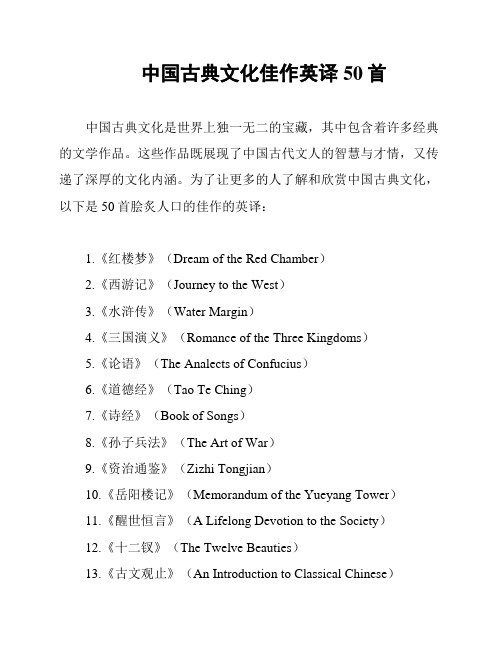
中国古典文化佳作英译50首中国古典文化是世界上独一无二的宝藏,其中包含着许多经典的文学作品。
这些作品既展现了中国古代文人的智慧与才情,又传递了深厚的文化内涵。
为了让更多的人了解和欣赏中国古典文化,以下是50首脍炙人口的佳作的英译:1.《红楼梦》(Dream of the Red Chamber)2.《西游记》(Journey to the West)3.《水浒传》(Water Margin)4.《三国演义》(Romance of the Three Kingdoms)5.《论语》(The Analects of Confucius)6.《道德经》(Tao Te Ching)7.《诗经》(Book of Songs)8.《孙子兵法》(The Art of War)9.《资治通鉴》(Zizhi Tongjian)10.《岳阳楼记》(Memorandum of the Yueyang Tower)11.《醒世恒言》(A Lifelong Devotion to the Society)12.《十二钗》(The Twelve Beauties)13.《古文观止》(An Introduction to Classical Chinese)14.《孔子家语》(The Family Sayings of Confucius)15.《庄子》(Zhuangzi)17.《新唐书》(New Book of Tang)18.《老子》(Laozi)19.《文心雕龙》(Literary Mind and the Carving of Dragons)20.《史记》(Records of the Grand Historian)21.《道藏》(Taoist Canon)23.《尚书》(Book of Documents)24.《浮生六记》(Six Records of a Floating Life)25.《唐诗三百首》(Three Hundred Tang Poems)27.《明史》(History of Ming)28.《天演论》(Natural Law in the Spiritual World)29.《荣宗正谱》(Genealogy of the Worthy Linage)30.《镜花缘》(The Romance of the Rose)31.《弟子规》(Standards for Being a Good Student and Child)32.《神雕侠侣》(The Return of the Condor Heroes)33.《富春山居图》(Dwelling in the Fuchun Mountains)35.《幼学琼林》(Young Learning in the Jade Forest)36.《山海经》(Classic of Mountains and Seas)37.《齐民要术》(Important Techniques for the Welfare of the People)39.《太乙金华宗旨》(The Secret of the Golden Flower)40.《七祖文集》(The Platform Sutra of the Sixth Patriarch)41.《楚辞》(Chu Ci)42.《农桑辑要》(Essentials for Peasants and Mulberry Planters)43.《论衡》(Discourses Weighed in the Balance)45.《龙图腾》(Dragon Totem)46.《儿女英雄传》(The Heroes and Heroines)47.《神仙传》(Biographies of Divine Immortals)48.《净世瑜伽论》(Yoga of Purification and Enlightenment)49.《高阳台忆峡山》(Memories of Xia Mountain from the High Sun Terrace)50.《统一魏武昭王伐蜀记》(Account of King Wei Wu's Conquest of Shu)这些作品涵盖了中国古代文化的方方面面,无论是小说、诗歌、历史还是哲学,都有着卓越的贡献。
中国的诗歌英语作文带翻译
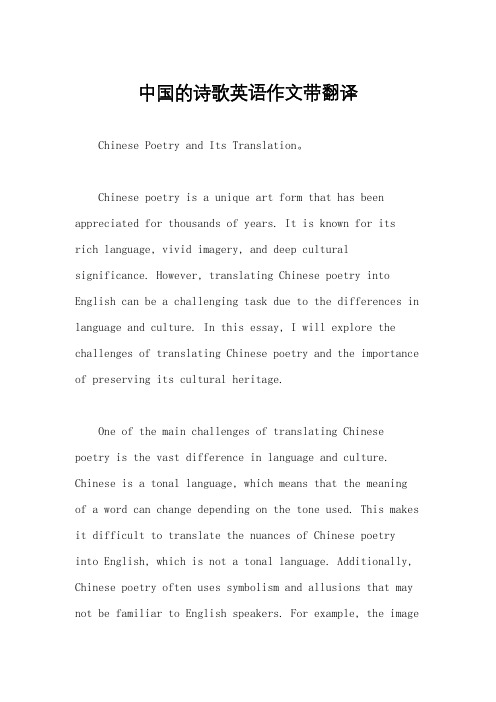
中国的诗歌英语作文带翻译Chinese Poetry and Its Translation。
Chinese poetry is a unique art form that has been appreciated for thousands of years. It is known for itsrich language, vivid imagery, and deep cultural significance. However, translating Chinese poetry into English can be a challenging task due to the differences in language and culture. In this essay, I will explore the challenges of translating Chinese poetry and the importance of preserving its cultural heritage.One of the main challenges of translating Chinese poetry is the vast difference in language and culture. Chinese is a tonal language, which means that the meaning of a word can change depending on the tone used. This makes it difficult to translate the nuances of Chinese poetryinto English, which is not a tonal language. Additionally, Chinese poetry often uses symbolism and allusions that may not be familiar to English speakers. For example, the imageof a willow tree in Chinese poetry symbolizes sadness and mourning, while in English poetry it may symbolize beauty or grace.Another challenge of translating Chinese poetry is the importance of preserving its cultural heritage. Chinese poetry is not just a form of art, but also a reflection of Chinese history and culture. It is often used to express the emotions and experiences of the Chinese people, as well as to convey their values and beliefs. Therefore, it is important to translate Chinese poetry in a way that accurately reflects its cultural significance.Despite these challenges, many translators have attempted to translate Chinese poetry into English. One of the most famous translators of Chinese poetry is Arthur Waley, who is known for his translations of Tang Dynasty poetry. Waley's translations are highly regarded for their accuracy and poetic beauty, and have helped to introduce Chinese poetry to a wider audience.In recent years, there has been a growing interest intranslating Chinese poetry into English. This has been driven in part by the increasing globalization of culture, as well as by the desire to preserve Chinese cultural heritage. Many contemporary poets and translators are experimenting with new forms of translation that aim to capture the essence of Chinese poetry in English.In conclusion, translating Chinese poetry into English is a challenging but important task. It requires an understanding of both languages and cultures, as well as a deep appreciation for the art form. By preserving and translating Chinese poetry, we can ensure that its cultural heritage is passed down to future generations and appreciated by people around the world.中国诗歌及其翻译。
110. 中华优秀传统文化 -宋词(中英文对照版)沁园春-题潮阳张许二公庙文天祥(著)、许渊冲(译

中华优秀传统文化 --- 宋词(中英文对照版)沁园春 | 题潮阳张许二公庙作者:文天祥为子死孝,为臣死忠,死又何妨。
自光岳气分,士无全节;君臣义缺,谁负刚肠。
骂贼张巡,爱君许远,留取声名万古香。
后来者,无二公之操,百炼之钢。
人生翕歘云亡。
好烈烈轰轰做一场。
使当时卖国,甘心降虏,受人唾骂,安得流芳。
古庙幽沉,仪容俨雅,枯木寒鸦几夕阳。
邮亭下,有奸雄过此,仔细思量。
Spring in a Pleasure Garden | Written in the Templ e of Zhang Xun and Xu Yuan翻译:许渊冲If sons should die for filial piety and ministers for l oyaltyWhat matters for us to be d eadOur sacred land is torn in shreds, no patriot could feel at easeHave loyal subjects d one what they ought toHow coul d my righteous wrath appeaseZhang Xun, whom the rebels coul d not subdueand Xu Yuan were loyal to the crownThey've left an undying renownThose who come after them should feel the lackof their l oyal zealand they should be hardened into steelLife will soon pass away like a flickering flameA man should work, shine or rain, with all his might and mainIf Zhang and Xu had fallen to the foe, they woul d have borne the blameand d own in history their names coul d never goTheir templ e gl oomy at the forest's sid e, their statues, awe-inspiring, dignified how many times have they been worshipped when crows flyover ol d trees and the setting sun kindl es the skyShoul d a traitor pass by, l et him open his eye。
- 1、下载文档前请自行甄别文档内容的完整性,平台不提供额外的编辑、内容补充、找答案等附加服务。
- 2、"仅部分预览"的文档,不可在线预览部分如存在完整性等问题,可反馈申请退款(可完整预览的文档不适用该条件!)。
- 3、如文档侵犯您的权益,请联系客服反馈,我们会尽快为您处理(人工客服工作时间:9:00-18:30)。
浅议中原诗歌文化英译
摘要:中国是诗的国度,中原诗歌文化是中国诗歌文化的滥觞。
在古诗英译中,怎么有效传译诗歌丰富意蕴一直是诗歌翻译界的热点和难点。
笔者拟采用互文释义转换法和格式塔理论来对中原诗歌文化英译做尝试和探索,以期对我国优秀传统文化的传扬有所帮助。
关键词:中原诗歌文化;英译
【中图分类号】g640
苍茫大地,日起东方。
中原地区自古以来便被华夏民族视为天下之中心,”中原”在上古又称作”中国”,最早它的文化含义已经超出了它的地理范畴,华夏族踞中原而居,由此也决定了它远播西方,气贯长虹的引领作用。
中原文化五彩缤纷,色彩斑斓,从文学体式上说,中国的散文与诗歌都发源于中原,在中原形成成熟的形态,并影响到南方地区;而且,辞赋、诗歌等的创作都在中原地区形成高峰,并创造了中国文学无与伦比的汉唐气度。
那么,当我们置身于经济全球化和文化多元化的时代,从文化交流和传播的角度,该怎样精准地传译中原诗歌文化,并使之发扬光大呢?下面笔者试两例以说明:
1. 互文释义转换
互文性是根据英文术语”intertextuality”翻译成汉语而成的文本理论术语,或可译为”文本间性”或是”文本互涉”。
这一概念最初是由法国符号学家、女权主义批评家朱丽娅·克里斯蒂娃(julia kristeva)在其1969 年出版的《符号学:解析符号学》一
书中提出的。
“简而概之,互文性的基本内涵可以理解为每一个文本都是其它文本的镜子,每一文本都是对其它文本的引用、改写、吸收、扩展或在总体上的改造与转化,它们互相参照,彼此牵连,形成一个潜力无限的开放网络,以此构成文本过去、现在、将来的巨大开放体系和文学符号学的演变过程。
要理解一个文本,首先就要理解这个确定的文本与它所引用、改写、吸收、扩展或在总体上改造与转化的其他文本之间的关系。
互文性具有双重意义:它既是文本分析中一个抽象的理论概念,又能应用于某个具体文本的句子段落”[1]。
因此,与传统钓的翻译理论相比,”在原文本到生成文本的过程中,译者同时扮演着三重角色:原文本的读者、阐释者和生成文本的作者。
这也在一定意义上颠覆了’译者是戴着镣铐跳舞的舞者’这一说法。
此外,互文性理论关照下的翻译研究对独创性问题、翻译标准、复译现象等做出了更为客观的评价。
”[2]根据此翻译理论,下面我们来看李商隐的这首《锦瑟》:锦瑟无端五十弦,一弦一柱思华年。
庄生晓梦迷蝴蝶,望帝春心托杜鹃。
沧海月明珠有泪,蓝田日暖玉生烟。
此情可待成追忆,只是当时已惘然。
李商隐,晚唐最著名的诗人,以其独特的诗文魅力为中原诗歌文化再添上了浓墨重彩的一笔。
他生于古都郑州地界,和杜牧合称”小李杜”,与温庭筠合称为”温李”。
他的诗文承袭杜子美七律的沉郁顿挫,融合齐梁诗的华丽浓艳,学李贺诗的鬼异幻想,自成其。
他深情、缠绵、绮丽、精巧的风格。
题中所引这首诗是李商隐罢官
后退居郑州病逝之前所写的绝笔诗,时年46岁。
诗人一生,有难言之痛,至苦之情,郁结一世,终难付诸笔端,而这首诗正是将他一生身世的悲怆,理想的幻灭,爱情的悲剧,人生路途的迷茫和无穷的遗恨,一并括在诗的形象之中,让人思绪万千。
开头两句,由锦瑟起兴,聆锦瑟繁弦,思华年往事;纵然音繁绪乱,也还是怅惘难言。
“无端”写其内心愤懑,功名未就,风月蹉跎。
玉溪生有两件至为伤情之事:官场中,因卷入牛、李之争,仕途坎坷,终生潦倒;而情场更是终生悲剧,心灰意冷。
开联即是伤情。
颔颈二联,共用了四个典故,庄生梦蝶,杜鹃啼血,鲛人泣泪,玉暖生烟来铺陈华年之思。
整首诗情味婉曲,深挚哀痛。
从诗歌翻译的角度讲,若能切实地向译文读者传递声美、形美与意美,那就是成功的译文了,然而译诗之难是人所公知的。
面对像《锦瑟》这样一首互文性极强的诗歌,我们该怎样将互文联想和意象蕴含都传递给译文读者呢?下面我们来看许渊冲先生的译文:the sad zitherwhy should the zither have fifty strings? each string, each strain evokes but vanished springs: dim morning dream to be a butterfly; amorous heart poured out in cuckoo’s cry. in moonlit pearls see tears in mermaid’s eyes; from sunburn jade in blue field let smoke rise! such feelings can not be recalled again. it seemed long-lost e’en when it was felt then.[3]
译文的意思是:为何锦瑟五十弦?弦弦使我忆流年。
晨昏梦蝶,杜鹃啼泣,鲛人珠泪,良玉生烟,此情怎追忆,当时已惘然。
互文
性理论认为译者”应该对文本隐喻的复杂性、主体交融的多重性、语言文化的互动性以及翻译与创作的渗透性”都有所阐释[4]。
正如后结构主义大师罗兰·巴特指出:原文作者已死,每一次翻译和重构都融入了译者全新的互文性体验和感受[5]。
许先生把”沧海月明珠有泪”译成了”in moonlit pearls see tears in mermaid’s eyes”,把”月明”和”珠”合译为moonlit
pearls(月明珠),虽不见”海”,但把西方经典的”美人鱼”的童话故事互文地引用到译文中来,译文中融入了自己的互文理解并进行了创造性地改写。
”mermaid “一词足以含蕴”沧海”之意,而且译文读者可以从英语文化中美人鱼凄美哀婉的故事中,在他们熟悉的互文性联想中寻求情感上的共鸣,苍凉婉转的意境便油然而生了。
2.格式塔语符空白填充
格式塔心理理论认为”心理现象是在意识经验中所显现的结构性或整体性。
知觉决不是感觉相加的总和, 思维也不是观念的简单联结。
理解是对已知事件的旧结构的豁然改组或新结构的豁然形成。
”[6]因此, 整体大于部分之和, 形式和关系可以形成一种新的质, 这就是”格式塔质”。
它不属于任何具体的部分, 却可以涵盖各个部分, 并且赋予它们新的含义。
汉语诗词的丰富意蕴其实就是一种”格式塔质”,也就是说,虽然它是依靠构成诗篇的一个个词语来体现或蓄含, 却远远超过这些词语意义之和。
古诗词曲一向追求以有限之词表达无限之蕴,也正是因为这些在”言”、
象”、”意”等层面出现的未言明之意,给译者和读者留下了无限广阔的想象空间。
”对于英、美读者来说, 一首汉语诗词即使结构十分完整, 没有任何’未定点’和’空白’,也只是他们都不认识的’形象’,因为他们不识汉语文字,不懂中国文化,无从理解其意义。
因此, 译者在进行译诗语篇重构时必须为译诗读者着想,尽可能按照译入语的表达习惯填充语言符号的空白,补缀语句成分的缺省。
只有这样才能有助于他们理解诗中诸多意象之间的彼此联系,从整体上把握和理解诗词的意境内涵。
”[7]因此在实际翻译操作时,我们还需从整体把握原诗意蕴,依照实际需要来语篇重构。
下面请看曹植的《七步诗》:
煮豆燃豆萁, 豆在釜中泣;
本是同根生, 相煎何太急。
